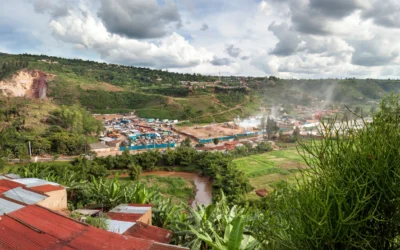OPINION by Laura Payne, Co-founder of Scature
We stand at a transformative crossroads in addressing climate change, and the solutions we choose today will shape the world we live in tomorrow. To effectively combat this issue, it’s essential to understand the interplay of greenhouse gases and the role of water vapor in climate dynamics.
While water vapor itself does not directly cause global warming from human activities, it plays a significant amplifying role. As the Earth warms due to the increased concentration of CO₂ and other greenhouse gases, more water evaporates into the atmosphere. This additional water vapor traps heat, which further accelerates global warming. Its increase is a feedback mechanism that intensifies the warming caused by other gases.
Given this, addressing climate change requires a holistic approach, combining strategies for reducing greenhouse gases like CO₂ with efforts to restore balance to the water cycle. One of the most effective ways to achieve this is through nature-based carbon removal.
Nature-based solutions such as regenerative agriculture offer a pragmatic and scalable way to withdraw excess CO₂ from the atmosphere while simultaneously restoring vital ecosystems and improving soil health. Through regenerative practices like agroforestry, managed grazing, and soil carbon sequestration, we can store carbon in the land, reduce atmospheric CO₂, and restore biodiversity—all while enhancing the resilience of ecosystems to climate change.
Importantly, the impact of nature-based solutions can be easily measured and verified through soil samples, satellite imagery, and other monitoring tools. This ensures transparency, accountability, and confidence that these initiatives are delivering real and measurable climate benefits.

A Little Wild in Malaysia.
Despite their significant potential, nature-based solutions currently receive only 3% of global climate finance. At Scature, we are committed to changing this. We partner with local carbon farmers to integrate carbon removal initiatives into supply chains, helping companies reduce their residual emissions (Scope 1 and 2) and address Scope 3 emissions. By supporting small-scale farmers in transitioning to regenerative practices, we not only help mitigate climate change but also boost biodiversity, improve water retention, and restore the broken water cycle.
Our approach aligns with evolving European legislation and provides a clear pathway for organizations to achieve their net-zero goals. If we can convert half of the world’s agricultural lands to regenerative practices, we can not only keep global warming below the critical 2°C threshold, but we will also rebuild ecosystems, improve soil health, and restore the water cycle—vital components for a sustainable future.
For organizations committed to achieving net-zero emissions, investing in nature-based carbon removal credits is an essential step. These investments help balance unavoidable emissions, while simultaneously addressing broader environmental challenges such as biodiversity loss, soil degradation, and water scarcity. By supporting regenerative farming and carbon removal projects, companies can create long-lasting environmental impact, while also contributing to a more resilient and sustainable global economy.
Regenerative farming emphasizes natural practices that restore soil health, prevent erosion, and foster biodiversity. This approach ensures that carbon remains stored in the soil for the long term, providing an effective solution to combat climate change. However, it’s a solution that requires expertise and support for farmers, many of whom need additional revenue streams to continue their essential work as stewards of our ecosystems.
By investing in nature-based carbon removal credits, companies demonstrate a genuine commitment to impactful climate action. The urgency for addressing climate change is clear, and embracing these solutions represents a meaningful step toward a sustainable and thriving future. We invite you to join Scature and explore how your organization can contribute to this vital journey.




